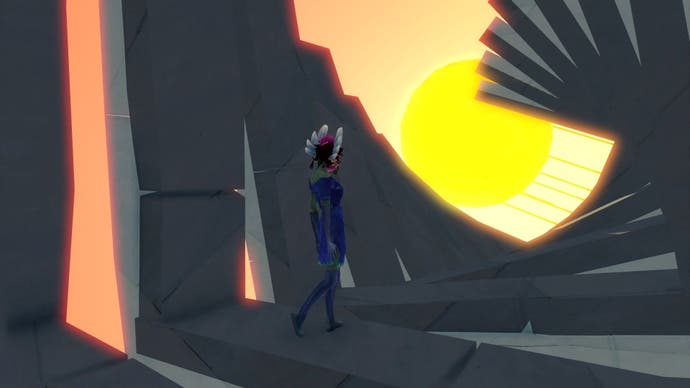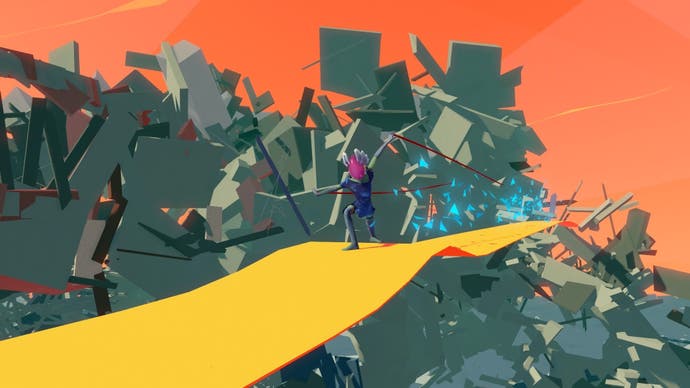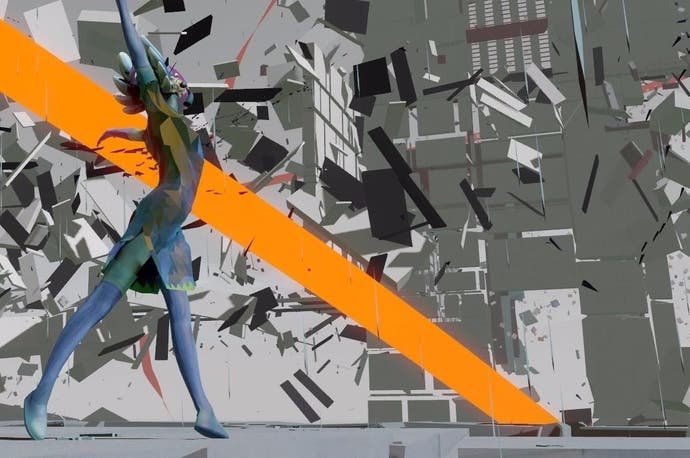PlayStation's Bound, and the enigma of the notgame
Bound in flame.
Sony's love of all things indie might be a relatively new outlook, but its love of all things quirky goes back a little longer. When Linger in Shadows came out on the PlayStation Store seven long years ago, it was an outright oddity; a surreal, semi-interactive doodle with its roots in the demoscene, the sort of experiment you might stumble upon in the corner of a boutique East End gallery and most definitely not the kind of thing you'd expect to find on a console with first-party backing.
The PlayStation's outlook has changed since then, but Sony's appetite for the bizarre hasn't dimmed in the slightest. Polish studio Plastic is back, the developer behind Linger in Shadows and its wayward, PlayStation Move-enabled follow-up Datura ("we got stuck doing things that maybe didn't work," admits game director Michal Staniszewski). Plastic is returning after three years away with Bound, an arrestingly different game that made its debut at the PlayStation Experience in San Francisco.
"Linger in Shadows, it was like our first test, a maturity test like when you finish high school," Staniszewski tells me when I step away, slightly dazed, from a short demo of Bound. "Datura, that was like a bachelor degree - this is our master degree."

It's a masters in fine art, for sure. Bound is wilfully, aggressively artful, an adventure that moulds the essence of thatgamecompany's Journey into a cast that carries the marks of Piet Mondrian and Kazimir Malevich, and if Linger in Shadows felt like a rough and energetic student show, then this feels like an afternoon at the Tate. Bound's aesthetic is an effective composite of art concrete and Bauhaus, all jagged angles and big banks of colour, making the world you explore endlessly fascinating.
Thankfully - and this is where Bound gets really interesting - it's a pleasure to explore, as this is a game that's in love with the idea of movement. Your character bounds and pirouettes through the environment, their moves modulated by several modifiers at your disposal. It's an expressive dance, which makes the simple act of getting from A to B a joy.
"With the dancing inspiration, there are many different styles in there," says Staniszewski. "You see ballet in there, there's also modern jazz and also moves from ice-skating. When the character moves fast - you can play very fast - then we're using some moves from ice-skating. It's a mix. We wanted to add a personality to the character. When we had the first iteration of the character, it was working, but we wanted to add something different."
The rest of Bound is no less interesting, even if the details are a little fuzzier. In our short demo we explore a small, abstract space, working through several simple puzzles and engaging in some light traversal before being greeted with a wordless, enigmatic cut-scene as we plunder the depths of a jagged sea. Journey's a touchstone, with Bound being a game that encourages exploration without placing any significant barriers in the player's way, though Plastic wants to take that even further. They've even come up with a new term - one that's sure to infuriate as many people as it delights - for what they're striving for.
"We call it notgame," Staniszewski tells me, before going into more detail on a definition. "For example, you can fall - when you jump, you can fall, when you roll you can fall. When you walk, you won't fall. It's super easy. You can go through the game and it's super easy. And if you do fall, there's no penalty for doing so.
"The story is only the main task, and then there are the puzzles. We don't have any actual puzzles that require you to think for more than 30 seconds. If there's a puzzle you already know from other games, it turns into work, and you get bored of it already. This is one of the foundation pieces for notgame to work."
Considering the long, painful and often fruitless arguments about what is and isn't a game, you sense that Staniszewski could be entering prickly territory, but I think what he's striving for is the idea of something that's fun without any imposing objectives, an idea I'm sure we could all get behind. "A notgame racing game is when you go into a car and just drive," he explains a little further. "You go into the world and explore it. There are no tasks, there's no user interface, nothing. This is the notgame part."

There is another aspect of Bound, and one that promises to add a framework, and a reason to return to the world Plastic has created. Unfortunately, given how Bound sits outside of so much of what's on show at the PlayStation Experience, it's still beholden to PR beats, and what could be its most fascinating aspect is being purposefully held back.
"I wouldn't say too much about it right now, because we'd like to reveal it later," says Staniszewski. "You know Journey, of course. Journey is really nice - the problem is that when you'd like to play for a second time, a third time, it's hard because it's pretty much the same. The multiplayer adds a lot, but if you don't have that it's a one time experience. We wanted to change that, and have some kind of replayability. You can play, play, play it again and see different things. We're keeping it secret, but it's something that's very interesting. It's very simple, but I haven't seen it in any other game. This demo, it's not even the beginning of the game. It shows you the basics of controls, the characters and the environment."
15 minutes with Bound, and a short conversation with Staniszewski, is enough to suggest it's worth finding out what lies beyond. Plastic's experiments with Linger in Shadows and Datura were always some of the more interesting esoterica to seek out on PlayStation - and with this, it seems they've made the leap from the demoscene to something much more expansive, and potentially something much more impressive.
This article is based on a press trip to San Francisco. Sony paid for travel and accommodation.




